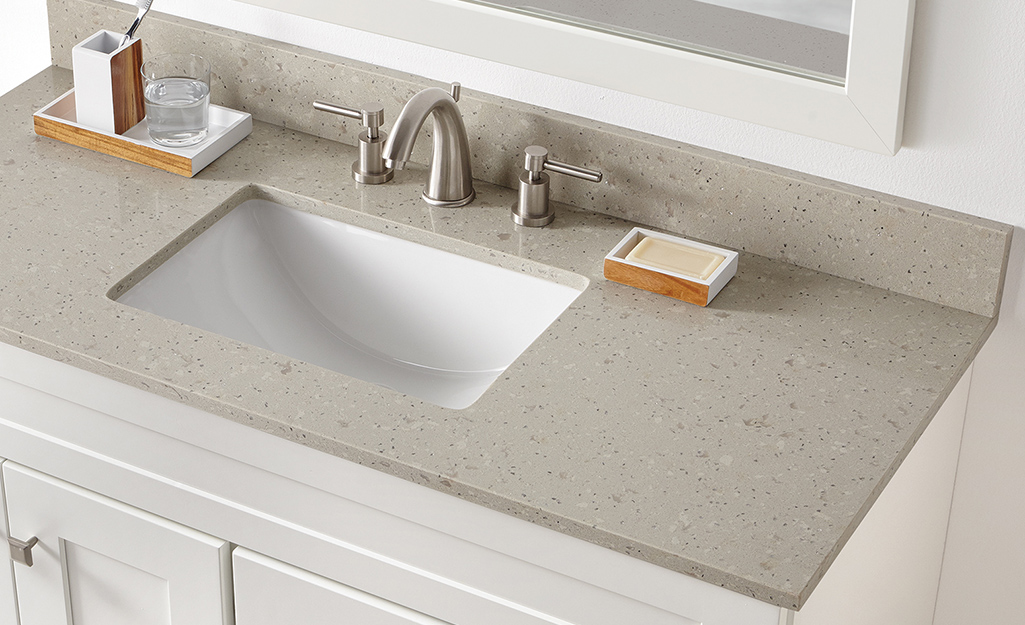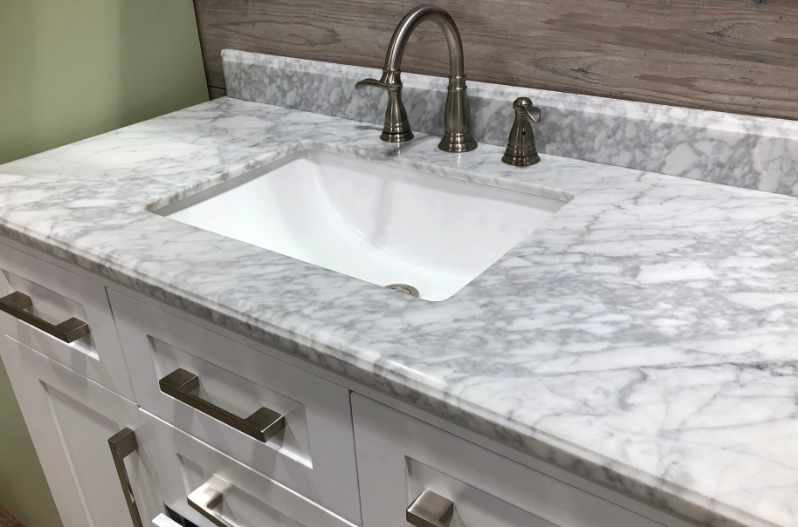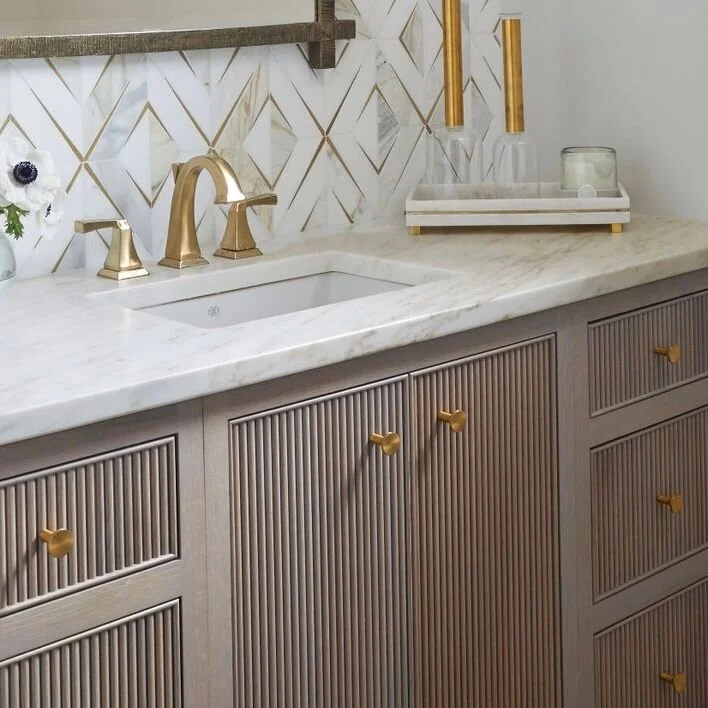Popular Bathroom Countertop Materials

Choosing the right countertop material for your bathroom is an important decision, as it impacts both the aesthetics and functionality of the space. It’s crucial to consider factors like durability, stain resistance, water resistance, maintenance requirements, and cost. Let’s explore some of the most popular options.
Natural Stone
Natural stone countertops, such as granite, marble, and travertine, are known for their elegance and unique beauty. Each slab possesses a distinctive pattern and color, making it a truly one-of-a-kind design element.
Pros of Natural Stone
- Durability: Natural stone is incredibly hard and resistant to scratches and abrasions, making it a long-lasting choice for high-traffic areas like bathrooms.
- Heat Resistance: It can withstand high temperatures, making it suitable for placing hot styling tools or curling irons on the surface.
- Unique Aesthetics: The natural variations in color and pattern make each countertop truly unique, adding a touch of elegance and sophistication to the bathroom.
Cons of Natural Stone
- Porosity: Natural stone is porous, meaning it can absorb liquids, which can lead to staining. Regular sealing is required to prevent this.
- High Cost: Natural stone is generally more expensive than other countertop materials.
- Maintenance: It requires regular cleaning and sealing to maintain its beauty and prevent damage.
Engineered Stone
Engineered stone, also known as quartz, is a composite material made by combining crushed quartz with resins and pigments. It offers the beauty of natural stone with enhanced durability and practicality.
Pros of Engineered Stone
- Durability: Engineered stone is highly resistant to scratches, chips, and stains, making it a low-maintenance option.
- Non-Porous: Unlike natural stone, engineered stone is non-porous, meaning it won’t absorb liquids and is less susceptible to staining.
- Wide Range of Colors and Patterns: Engineered stone is available in a wide variety of colors and patterns, offering design flexibility.
Cons of Engineered Stone
- Cost: While more affordable than natural stone, engineered stone is still a relatively expensive option.
- Limited Natural Variation: Unlike natural stone, engineered stone has a more uniform appearance, lacking the unique variations found in natural materials.
Laminate
Laminate countertops are made by layering paper or plastic with resin and then applying a decorative layer on top. They are a budget-friendly option that offers a wide range of styles and colors.
Pros of Laminate
- Cost-Effective: Laminate countertops are significantly more affordable than natural or engineered stone.
- Easy Maintenance: They are easy to clean and maintain, requiring only regular wiping with a damp cloth.
- Variety of Styles: Laminate countertops come in a wide range of styles, colors, and patterns to suit various tastes and budgets.
Cons of Laminate
- Durability: Laminate countertops are less durable than natural or engineered stone and are susceptible to scratches and chips.
- Heat Resistance: Laminate is not heat-resistant and can be damaged by hot objects.
- Seams: Laminate countertops often have visible seams, which can detract from their appearance.
Solid Surface
Solid surface countertops are made from a non-porous material, typically acrylic or polyester resin, that is poured and then cured. They are known for their seamless look and ease of maintenance.
Pros of Solid Surface
- Seamless Design: Solid surface countertops have a smooth, seamless surface, creating a sleek and modern look.
- Non-Porous: Solid surface is non-porous, making it resistant to stains and bacteria.
- Repairable: Minor scratches and chips can be easily repaired, extending the lifespan of the countertop.
Cons of Solid Surface
- Heat Sensitivity: Solid surface countertops can be susceptible to heat damage from hot objects.
- Cost: Solid surface countertops are more expensive than laminate but less expensive than natural or engineered stone.
Tile
Tile countertops are a versatile option, offering a wide range of materials, colors, and patterns. They can be used to create unique and personalized designs.
Pros of Tile
- Versatility: Tile countertops offer a wide range of materials, colors, and patterns, allowing for customization.
- Durability: Tile is a durable material, resistant to scratches and chips.
- Cost-Effective: Tile countertops are generally more affordable than natural or engineered stone.
Cons of Tile
- Grout Maintenance: Tile countertops require regular cleaning and sealing of the grout to prevent staining and mildew growth.
- Seams: Tile countertops have visible seams, which can detract from their appearance.
Comparison Table, What is the best bathroom countertop material
| Material | Durability | Stain Resistance | Water Resistance | Maintenance | Cost |
|---|---|---|---|---|---|
| Natural Stone | High | Moderate | Moderate | High | High |
| Engineered Stone | High | High | High | Low | Moderate |
| Laminate | Low | Low | Moderate | Low | Low |
| Solid Surface | Moderate | High | High | Low | Moderate |
| Tile | High | Moderate | Moderate | Moderate | Moderate |
Factors to Consider When Choosing a Countertop: What Is The Best Bathroom Countertop Material

Choosing the right countertop for your bathroom is a crucial decision that significantly impacts the overall look, functionality, and longevity of the space. It’s not just about aesthetics; it’s about selecting a surface that complements your bathroom’s style, fits your budget, and meets your practical needs.
Bathroom Style and Design
The style of your bathroom plays a vital role in countertop selection. A modern bathroom might call for a sleek, minimalist countertop like quartz or porcelain, while a traditional bathroom might benefit from the warmth and elegance of granite or marble. Consider the overall design aesthetic of your bathroom and choose a countertop that complements the existing fixtures, cabinets, and flooring.
Installation and Maintenance
The installation and maintenance of your bathroom countertop are crucial aspects to consider, as they significantly impact the longevity and aesthetics of your bathroom. Proper installation ensures a seamless and durable countertop, while regular maintenance preserves its beauty and functionality.
Installation Process
The installation process varies depending on the countertop material chosen. Understanding the steps involved and potential challenges associated with each material is essential for a successful installation.
- Granite and Marble: These natural stone countertops require skilled professionals for installation. The process involves measuring, cutting, and fitting the stone slabs to the desired shape and size. The slabs are then adhered to the substrate using a specialized adhesive and sealed with a protective sealant to prevent staining and water damage. Challenges can arise from the weight and fragility of the stone, requiring careful handling and precise cutting.
- Quartz: Quartz countertops are engineered stone, offering durability and ease of installation. They are typically prefabricated in slabs, making the installation process more straightforward. The slabs are cut and fitted to the desired shape and size, then adhered to the substrate using a specialized adhesive. Sealing is not typically required, as quartz is naturally non-porous. However, regular cleaning is still recommended to maintain its pristine appearance.
- Laminate: Laminate countertops are a budget-friendly option known for their ease of installation. They are typically prefabricated in sheets, making them relatively simple to cut and install. The sheets are adhered to the substrate using a specialized adhesive and sealed with a protective sealant to prevent moisture damage. Laminate countertops are susceptible to scratches and heat damage, requiring careful handling and maintenance.
- Solid Surface: Solid surface countertops are a versatile option offering seamless joints and easy repairs. They are typically prefabricated in slabs, making installation similar to quartz countertops. The slabs are cut and fitted to the desired shape and size, then adhered to the substrate using a specialized adhesive. Solid surface countertops are non-porous and require minimal sealing. Regular cleaning is recommended to maintain their smooth finish.
Sealing and Care
Sealing is a crucial step in maintaining the beauty and functionality of your bathroom countertop. It creates a protective barrier that prevents staining, water damage, and bacterial growth.
- Natural Stone (Granite and Marble): These materials are porous and require regular sealing to prevent staining and water damage. Sealing should be done every 1-2 years, depending on the level of use and the type of sealant used. A sealant is applied to the surface of the countertop, forming a protective barrier that repels liquids and stains.
- Quartz: Quartz countertops are non-porous and do not require sealing. However, regular cleaning is still recommended to maintain their pristine appearance.
- Laminate: Laminate countertops are typically pre-sealed at the factory. However, it is essential to apply a sealant to any exposed edges or seams to prevent moisture damage. Regular cleaning is also recommended to maintain the surface and prevent scratches.
- Solid Surface: Solid surface countertops are non-porous and do not require sealing. However, regular cleaning is still recommended to maintain their smooth finish.
Cleaning and Maintenance
Maintaining your bathroom countertop is essential for preserving its beauty and functionality. Regular cleaning and care can prevent stains, scratches, and damage, extending the lifespan of your countertop.
- Granite and Marble: Clean spills immediately with a damp cloth and mild soap. Avoid harsh chemicals, abrasive cleaners, and acidic substances, as they can damage the surface. Regular sealing is recommended to prevent staining and water damage.
- Quartz: Quartz countertops are relatively low-maintenance and can be cleaned with mild soap and water. Avoid harsh chemicals and abrasive cleaners, as they can damage the surface.
- Laminate: Laminate countertops are relatively easy to clean with a damp cloth and mild soap. Avoid harsh chemicals, abrasive cleaners, and heat, as they can damage the surface.
- Solid Surface: Solid surface countertops can be cleaned with mild soap and water. Avoid harsh chemicals and abrasive cleaners, as they can damage the surface.
What is the best bathroom countertop material – Choosing the best bathroom countertop material depends on your style and needs. Granite and quartz are popular choices for their durability and beauty, but they can be pricey. If you’re considering a DIY project, knowing the best way to remove bathroom silicone can come in handy when replacing old caulk around your sink or tub.
For a more affordable option, laminate countertops offer a wide range of styles and are easy to maintain.
Choosing the right bathroom countertop material can significantly impact the look and feel of your space. While durability and aesthetics are key considerations, don’t forget about the fittings! To ensure a cohesive and stylish bathroom, consider pairing your countertop with high-quality fittings from some of the best bathroom fittings brands in India.
From sleek faucets to elegant showerheads, these brands offer a wide range of options to complement your chosen countertop material and elevate your bathroom’s overall design.
